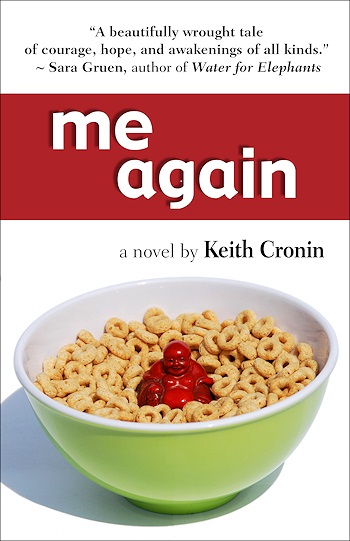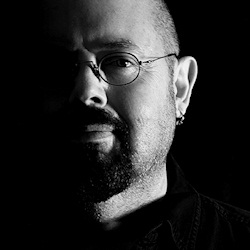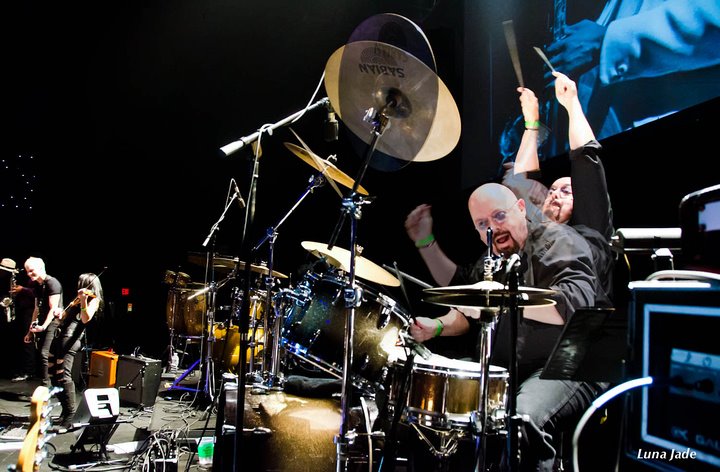AUTHOR INTERVIEW: Keith Cronin – Part 2
By Jan O'Hara | October 11, 2011 |
 Jan’s confession: Prior to reading Keith’s book, Me Again, I had no expectation of doing a two-part interview, but it wasn’t long before I succumbed to his Nick Hornby-ish voice. When my ex-physician self began to laugh, nod and applaud his fictionalized account of a very real health issue – recovery from stroke – I knew I was in.
Jan’s confession: Prior to reading Keith’s book, Me Again, I had no expectation of doing a two-part interview, but it wasn’t long before I succumbed to his Nick Hornby-ish voice. When my ex-physician self began to laugh, nod and applaud his fictionalized account of a very real health issue – recovery from stroke – I knew I was in.
For the story behind the book, and to how Keith overcame special craft issues posed by his narrator’s disabilities, please see Part 1.
Today, among other things, we’ll discuss the intersection of drumming and art.
Jan: In case we’ve permitted you to forget for five seconds, I’ve noticed a few facts: You’re a man. You’ve written an emotional story about personal transformation. It’s being marketed as women’s fiction.* You tolerate questions around this “anomaly” with the humour and equanimity I’ve come to expect. In other words, you seem to have a secure identity.
Did the writing/publishing/marketing of this book create or cement any of that security? If so, how?
Keith: When writing Me Again, it hadn’t occurred to me that it would be marketed as women’s fiction, but I did specifically try to write a story that I thought would resonate with women. I knew that would require opening up emotionally more than in the previous things I’ve written. So I went for it, and dug deeper than I ever have, and ended up writing some things that to this day make me cry when I re-read them.
But I don’t know that this is so much an indication that I’m secure; if anything, it’s more of an acceptance of whatever vulnerability or insecurities I may have, and an attempt to leverage those qualities into emotionally powerful storytelling. Remember, I’ve spent the majority of my life on stage. I started playing drums professionally when I was fourteen, and I was active in local theater for several years prior to that. So all those years taught me to project a confidence that may exceed what I’m actually feeling.
And from having lived through the countless things that can go wrong onstage – whether it’s being stranded on a theater stage while you wait for a character to make a late entrance, or your bandleader falling down drunk, or your hair catching fire under the stage lights, or any number of appalling things – you learn one important truth:
You cannot die from embarrassment – even in situations so awful that you wish you could.
That hard-earned knowledge helps me take a fair amount of things in stride, particularly when there’s an opportunity to diffuse the situation through humor. And that last part is key: don’t underestimate humor’s deflective powers. Humor has been my buffer, my shield, and my social lubricant all my life.
Novelists and drummers seem to be very different sorts of entertainment professionals. Have your writing choices raised eyebrows within the musical world? If so, how are you handling it?
 Some musician friends have been surprised, but most are simply encouraging. They understand how hard it is to pursue a career in the arts, so if anything they respect the guts it takes to even try. And most are aware that I’m not some monosyllabic grunting beast (despite how I look when playing drums), so they aren’t necessarily surprised that I can form a coherent thought or two.
Some musician friends have been surprised, but most are simply encouraging. They understand how hard it is to pursue a career in the arts, so if anything they respect the guts it takes to even try. And most are aware that I’m not some monosyllabic grunting beast (despite how I look when playing drums), so they aren’t necessarily surprised that I can form a coherent thought or two.
Actually the first major artist I toured and recorded with, guitarist Pat Travers, was one of the first people to encourage me to write a book. I caught up with him at a show recently, some 20 years since I toured with him, and surprised him with a copy of my novel. He was delighted, and even asked me to sign it!
Has being a percussionist helped your writing? If so, how? And is there anything you’ve learned from writing that you use to improve your musical performance?
Music has taught me discipline, flexibility, and how to improvise – all of which are directly translatable to writing. And the instrument I play – the drums – gave me one added area of heightened sensitivity: rhythm. Good writing has a rhythm to it. I always read my stuff aloud, to check whether what I wrote sounds right. From listening to a lot of audio books I learned that one of the most reliable litmus tests of a piece of writing is how it sounds when read aloud. (Try it, and you’ll find that bad writing becomes SO conspicuous!) So I think my musician’s ear and sense of rhythm and phrasing are a big help to my writing.
I’m not sure that writing has brought any new dimension to my music, other than possibly a heightened awareness of song lyrics. I used to write a lot of music in the early 90′s, and if I ever get back into songwriting, I suspect I’ll uncover new insights stemming from the last decade of writing prose.
What did you learn in professional speechwriting that shortened your learning curve as a novelist?
There are two main schools of thought in speechwriting. One is that a well-written speech should sound good with anybody delivering it. But a second school of thought is that ideally you write for a specific voice – a voice you have studied and know intimately. Although I write for numerous executives, I have one primary client, and I’ve worked hard to master his voice, studying his rhythm, his vocabulary, and his comfort zones as a speaker and presenter. I apply those same principles to my fictional characters. It’s my mission to know them well enough to be able to craft not just dialog, but also thoughts and behavior that ring true to their personalities.
Writing professionally in a business context also teaches you how to treat writing as a job, to deal with edits and criticism, to work collaboratively, and to hit deadlines. But most of all, it keeps your tools sharp. In that respect writing is like music: the more you do it, the better you get, if you’re continuously pushing yourself to do your best.
Where would you like your writing career to be in ten years’ time?
Well, I doubt we could choose a more unpredictable decade for writers than the one we’re in. It’s truly a revolutionary time in publishing, after a century or so of glacially slow evolution. So I’ll hedge my bets and simply say that I hope I am successfully publishing ten years from now, writing stuff that makes people laugh, makes them cry, and above all, makes them think.
“If I weren’t already accustomed to feeling like an idiot several times a day, I’d have been embarrassed.”
I love this quote from Jonathan. In fact, I think I married it a few hundred years ago. ;) Speak to me about humility, Keith. Does it have value in the writing life?
Interesting question. I think as people and as artists, humility is important. Nobody likes a pompous jerk, and we’ve all seen success turn previously nice people into insufferable weenies. That said, I think it’s important for writers to try to project confidence in their own writing. Just as self-confident people tend to be perceived as more attractive and compelling, I think strong, confident writing is more fun to read than timid, meandering prose. So I guess I’d sum up my thinking as “write with confidence, but act with humility.”
I can’t think of a better note on which to end an interview. Thank you to Keith and you, the reader, for being here.
For more on Keith Cronin, please check out his Facebook and Twitter profiles, his website, or his posts on Writer Unboxed.
*For the rationale behind this decision, see Keith’s most excellent interview with Amy Sue Nathan.
Photography by Luna Jade










I like your philosophical foundation, Sir. Huzzah!
Great interview (both of you)! Especially love the idea of applying the principles of speechwriting to fiction, developing a consistent and credible voice. Elusive but necessary stuff.
A lovely conclusion to Part I. Thanks for sharing, Keith & Jan!
Every time I read an interview with Keith I learn something new. What an interesting professional background leading up to novel writing. I know this book is going to be such a treat!
Really interesting interview. I particularly liked your take on the two kinds of speechwriters, Keith. I try hard to fall into camp 2 with my business copywriting.
The books sounds great, I will definitely check it out!
Thanks, Sheri!
I strongly prefer “camp 2,” but there are times when I get assigned to write something with little-to-no contact with the principal, so I have to wing it with more generic prose. The challenge is to write something that can sound personal, while striving to keep it dummy-proof. Good times… :)
“But I don’t know that this is so much an indication that I’m secure; if anything, it’s more of an acceptance of whatever vulnerability or insecurities I may have, and an attempt to leverage those qualities into emotionally powerful storytelling.”
Love this. My work seems to resonate better with women. At first I was taken aback by the undeniable trend among my beta readers. I may of even been distressed for a time. I’ve come not only to accept it, but to think of it as a positive. I won’t make a wholesale claim to being an emotionally powerful storyteller, but I think I was willing to delve into my vulnerabilities, and I think women connect better with what I surfaced with than men.
Again, great interview with WU’s Renaissance Raconteur! Congrats to Jan and Keith!
Thanks again, Vaughn.
I think you’re smart to take note of who seems to be “getting” your writing, and letting that insight guide you. While I don’t want to feel constrained to writing in a certain style, I think it’s important to try to play to my strengths. Sounds like you’re doing likewise. Best of luck to you.
And hey, if ever you’re troubled about the audience you’re attracting, just remind yourself of this: Chicks dig you. :)
usually i don’t like this kind of books, they seem to be fake for me at all. but this man seems to be honest. i’d like to purchase and read the book, because from the interview i have the feeling, that he is a honest and real man. and i also love drummers:)
Jan, every time you do an interview I feel like I need to get out my highlighter to mark the sentences that teach me something. Definitely true today, as well. Thanks.
And Keith, I may need to pin this up and put it over my desk:
“You cannot die from embarrassment – even in situations so awful that you wish you could.”
Vaughn, if the sales figures are to be believed, you’re influencing the right sex.
Liz, I’m simply lucky in that all my subjects are quote-worthy. (That snippet you picked was my fave, too.)
Keith,
Thanks for your insights. I have a lot of musician friends and when we compare notes, it’s amazing how similar the creative process is when it comes to song-writing, playing a piece of music and writing. Very insipring post.
Great post. I just put a sticky note up that says: Write with confidence; act with humility. That’s a keeper.
That is very interesting ,combination between drummer and writing , very nice article